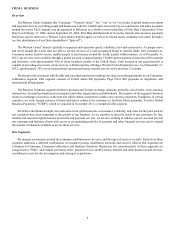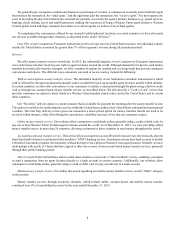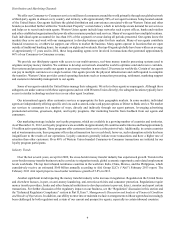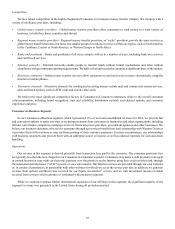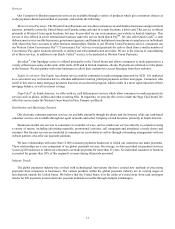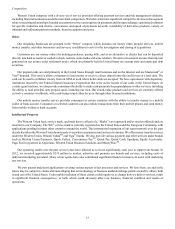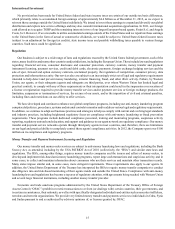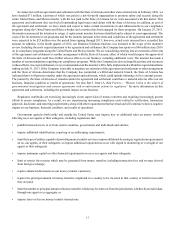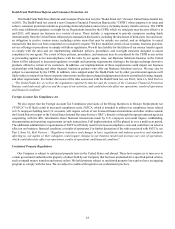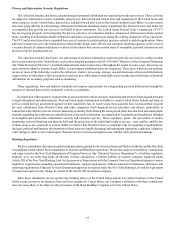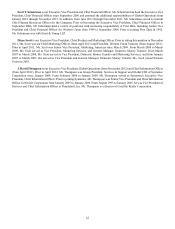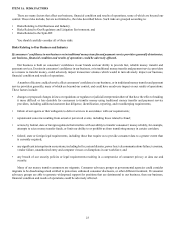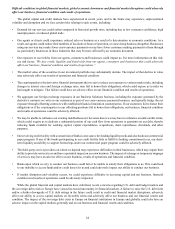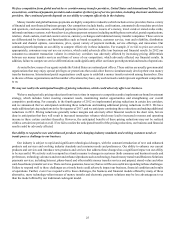Western Union 2012 Annual Report Download - page 21
Download and view the complete annual report
Please find page 21 of the 2012 Western Union annual report below. You can navigate through the pages in the report by either clicking on the pages listed below, or by using the keyword search tool below to find specific information within the annual report.16
In the United States, most states license money transfer services providers and many exercise authority over the operations
of our money transfer services and, as part of this authority, regularly examine us. Many states require us to invest the proceeds
of money transfers in highly-rated, investment grade securities, and our use of such investments is restricted to satisfy outstanding
settlement obligations. We regularly monitor credit risk and attempt to mitigate our exposure by investing in highly-rated securities
in compliance with these regulations. The majority of our investment securities, classified within “Settlement assets” in the
Consolidated Balance Sheets, are held in order to comply with state licensing requirements in the United States and had credit
ratings of “AA-” or better from a major credit rating agency as of December 31, 2012.
These licensing laws also cover matters such as government approval of controlling shareholders and senior management of
our licensed entities, regulatory approval of agents and in some instances their locations, consumer disclosures and the filing of
periodic reports by the licensee, and require the licensee to demonstrate and maintain certain net worth levels. Many states also
require money transmitters and their agents to comply with federal and/or state anti-money laundering laws and regulations.
Outside of the United States, our money transfer business is subject to some form of regulation in all of the countries and
territories in which we offer those services. These laws and regulations may include limitations on what types of entities may offer
money transfer services, agent registration requirements, limitations on the amount of principal that can be sent into or out of a
country, limitations on the number of money transfers that may be sent or received by a consumer and controls on the rates of
exchange between currencies. They also include laws and regulations intended to detect and prevent money laundering or terrorist
financing, including obligations to collect and maintain information about consumers, recordkeeping, reporting and due diligence,
and supervision of agents and sub-agents similar to and in some cases exceeding those required under the BSA. In most countries,
either we or our agents are required to obtain licenses or to register with a government authority in order to offer money transfer
services.
The Payment Services Directive (“PSD”) in the European Union (“EU”), along with similar laws in other jurisdictions, have
imposed new rules on payment service providers like Western Union. In particular, Western Union has become responsible for
the regulatory compliance of our agents who are engaged by one of our payments institution subsidiaries. Thus, the costs to monitor
our agents and the risk of adverse regulatory action against us because of the actions of our agents in those areas have increased.
The majority of our EU business is managed through our PSD subsidiary, which is regulated by the Central Bank of Ireland. Under
the PSD, we are subject to investment safeguarding rules and periodic examinations similar to those we are subject to in the United
States. These rules have resulted in increased compliance costs and may lead to increased competition in our areas of service.
Additional countries may adopt legislation similar to these laws. The PSD, as well as legislation in other countries such as Russia,
has also allowed an increased number of non-bank entities to become money transfer agents, thereby resulting in increased
competition.


